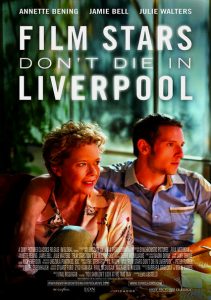Film Stars Don’t Die in Liverpool-2017
Director Paul McGuigan
Starring Annette Bening, Jamie Bell
Scott’s Review #840
Reviewed December 11, 2018
Grade: B+
Film Stars Don’t Die in Liverpool (2017) showcases a compelling performance by stalwart actress Annette Bening as she plays faded, insecure Hollywood glamour girl Gloria Grahame.
The film focuses only on Grahame’s final two years of life as she battles breast cancer and begins a relationship with a much younger man, Peter Turner (Jamie Bell).
The film is a sad yet poignant dedication to the star, featuring enough performance gusto from its actors to compensate for a limited period. However, there is too much back-and-forth within the timeline, which complicates the film too much.
As a result, Film Stars Don’t Die in Liverpool is endearing but does not hit it out of the park.
The entire film takes place between 1979 and 1981. In 1979, actress Gloria Grahame, with her best days behind her, resides in a rented Liverpool room. She finds some success in local theater and befriends her much younger male neighbor.
The pair become romantic partners and experience trials and tribulations as the film teeters back and forth between Grahame’s ailing final days in 1981 to happier times in Los Angeles and New York. Gloria also befriends and finally lives with Peter’s parents, who care for her unflinchingly.
The story is enveloped in sadness but is not a downer either.
The film begins towards the end of Gloria’s illness, though the audience is not yet aware of her disease’s seriousness. Insisting she has painful gas, the tender relationship between the actress and Peter is explored.
The story begins in 1979 when Peter and Gloria first met. He is an aspiring actor who is unaware of who she is until a bartender makes the connection.
In this way, the film makes it clear that this is not a story about a young man seeking the fortunes of a presumably wealthy woman. I like this point, as the story is about romance, not money-grubbing.
Film Stars Don’t Die in Liverpool belongs to Bening.
The supporting roles are well cast, and they do not diminish Bell’s performance or Julie Walters’s nice turn as Peter’s mum.
However, Bening does wonders emulating Grahame’s mannerisms with an innocent, damsel-in-distress nature (mirroring the roles she made famously).
Bening was amazing at revealing the actress’s insecurities, fear of aging, and older appearance. During a fight, Peter cruelly refers to her as an “old lady,” and we see the comment strike a deadly blow as if she had been physically slapped.
Bening is so good at portraying a myriad of emotions throughout the film.
Another high point comes towards the end of the film. I love how the film connects Gloria and Peter’s earlier argument (and breakup) with a later sequence.
Peter assumes she is carrying on with another man when he learns she has lied about her whereabouts. The haunting reality is later revealed, changing the audience’s perception of the events.
This is good writing by the screenwriters.
To counter the above point, the constant back and forth from 1981 to 1979 and everywhere in between detracts from my enjoyment of the overall film.
Although the film spans only two years, it spends way too much time in multiple locations without enough explanation. Suddenly, G, Loria, and Peter are in Los Angeles having dinner at Gloria’s modest house, and they are in New York City in her lavish Park Avenue apartment.
The film would have been better suited with a straightforward approach chronicling events from 1979 to 1981 in sequence.
Another negative is the omission of any scenes before 1979.
The actress’s career thrived during the 1940s and 1950s, so capturing those earlier days would have been interesting. If the fear was that Bening was too old to pass for a younger Grahame, another actress could have been used for those scenes.
While a clip of the real Grahame winning the Oscar and a few clips of her starring in films are nice, way more time could have been spent on more stories.
Thanks to a brilliant performance by Bening and an emotional story that in large part succeeds, Film Stars Don’t Die in Liverpool (2017) is a win.
The film was not recognized during awards season as initially anticipated. This could have been due to the overly complex timeline, which produced a limiting feeling. The production and writing are excellent but lack greatness.
